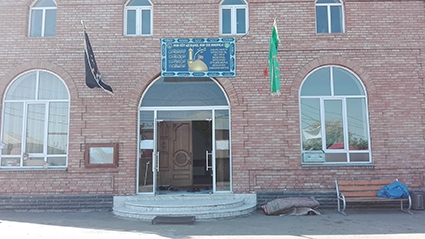The Marneuli Mosque Dispute
The state assigned the Marneuli located Imam Ali Mosque to the Georgian Muslims Department for 49 years of use. The local population, which is claiming the mosque back under their ownership, appealed Tbilisi City Court and are being represented by NGO Human Rights Education and Monitoring Center (EMC). The NGO believes the state acted in political interests when assigning the historical mosque to the Muslims Department and neglected the right of property of the local Muslim community.
“In 2014, they assigned the Imam Ali Mosque to the Georgian Muslims Department without informing the Marneuli population about it. The mosque was ruled by the independent body, the Shura (council), and is still ruled by it. The building was constructed with the money of the people. So, the population is claiming back ownership of the mosque,” said Mirtag Asadov, head of the Supreme Spiritual Department of the Georgian Muslims.
The Imam Ali Mosque was constructed in Marneuli in 1739. During soviet times, the building was used for various purposes and then destroyed. In 1998, the local population restored the place of worship on their own initiative and with their own resources. Religious services were resumed in the mosque in 2000 and an independent ‘Mosque Shura’ administered it.
In 2011, the Imam Ali Mosque was registered as state property. In 2014, based on the recommendation of the State Agency for Religious Affairs, the mosque was assigned to the Georgian Muslims Department for 49 years of use. The Department is a public law legal entity which was established in 2011.
Asadov, like many other Muslims, believes that the Georgian Muslims Department was established to gain influence over the Muslim community. “The Georgian government continues its attempt to reinforce and widen its control over the mosques,” he said.
Kavid Gurbanov is a parishioner of the Imam Ali Mosque. “The mosque should belong to the people who go there to pray. I don’t like the mosque being assigned to an organization which was established by the State. A local place of worship should not belong to anyone but the local community. I don’t want this issue to become a reason for controversy between Muslim people. The best solution to the problem is to free the mosque from political influence”.
Council member Amil Khalilov also requests the Imam Ali Mosque be returned to the local governing body-council. “The people constructed this mosque and the people should administrate it. The people elect the council members and they are the most-trusted and respected people in the local community”.
Representatives of the State Agency for Religious Affairs said the Georgian Muslims Department received 160 mosques in Georgia for the use and, as in all other cases, the Imam Ali Mosque was assigned to them on request.
Sheikh of the Georgian Muslims Department Ramin Igidov believes opponents are deceiving society and trying to instill controversy in the Muslim community. “All mosques in Georgia which are not registered to a concrete individual or private agency are assigned to the State. The same happened in case of the Imam Ali Mosque. The Ministry of Economics registered it and then assigned it to us for 49 years. The opponents have no ground to claim that the State registered the mosque as its property. The mosque belongs to the people but the State registered it. Ethnic Azerbaijani people are not the only Muslim community in Georgia; Muslims live in Adjara, Muslims are among the Kist and Avar communities. We unify all Muslims living in Georgia; we do not interfere in the activities of any mosque but only oversee them.”
Lawyer of the EMC, Eto Gvritishvili, said the State assigned the Imam Ali Mosque to the Muslims Department without substantial study of the historical and real ownership of the mosque. “The State did not take into account that a different organization, the Mosque Council, administered the mosque and carried out religious activities there. This case demonstrates a systemic problem which is related to the restitution of places of worship to the religious organizations which were seized during the soviet period. The State has not yet adopted the Restitution Law (return of places of worship under the right of ownership), which could create equal and legal standards for all organizations. We see that the State returns religious buildings only to those organizations which are loyal to them. The Georgian Muslims Department is one such organization. Although there are several Muslim organizations in the country, the State assigns mosques only to the Department. With regard to the assignment of the historical Imam Ali Mosque, we can say that the restitution process of historical buildings is ongoing in due respect of political interests. Several religious organizations have had problems restituting historical places of worship, among them the Catholic, Lutheran, and Armenian churches and Muslim and Jewish communities.”
The EMC’s lawyer thinks by infringing the property rights of a historical place of worship, the State rudely interfered in the affairs of the local religious organization and the space which is protected by the freedom of religion.
The Tbilisi City Court will start discussion of the lawsuit on December 5, 2017. The defendant in the dispute is the State Agency for Religious Affairs, State Property National Agency and the Ministry of Economics and Sustainable Development.
This article was prepared in the frame of a project implemented by the Human Rights House Tbilisi with financial support from the Embassy of the Kingdom of the Netherlands in Tbilisi. Human Rights House Tbilisi is responsible for the content of the article and the views in it do not necessarily express the views of the Embassy of the Kingdom of the Netherlands.
Nurana Mamadi for the Human Rights House Tbilisi












